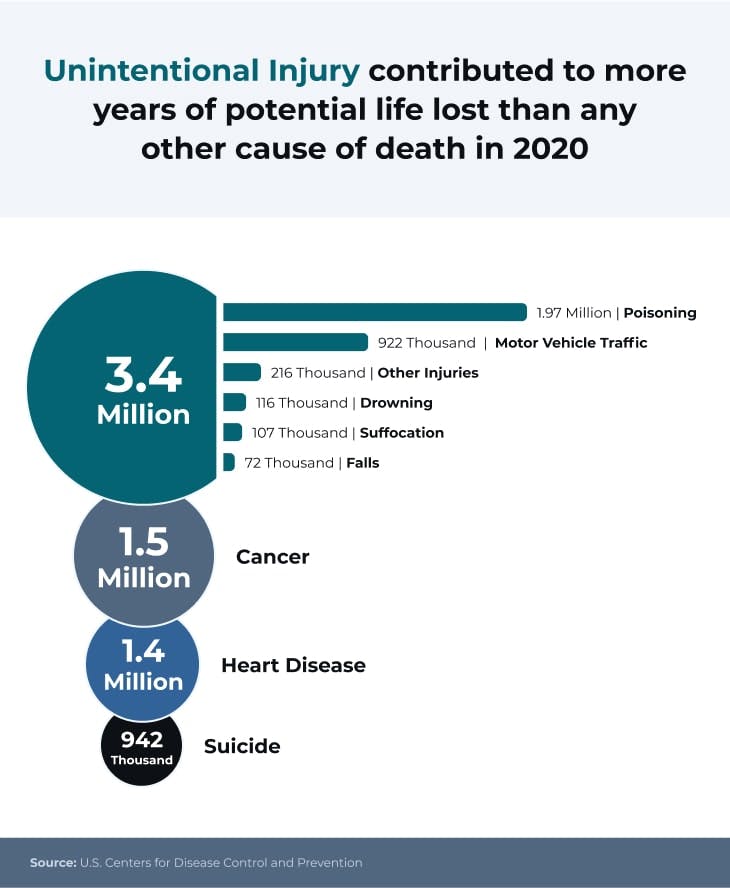
One of the worst tragedies that can befall a family is losing a loved one in an accident. While no amount of compensation can ease the pain of an untimely death, there are always practical considerations surrounding the death of a loved one. For instance, if the person initially survived the accident, there may be exorbitant medical expenses. In addition, there will be funeral expenses and other costs associated with the victim’s death.
If there was an estate, there might be little left for the survivors after all the other expenses. And then, there is the matter of justice for the deceased person. A wrongful death attorney can gather as much evidence as possible and hold the negligent party responsible.
The Pendergras Law Firm, LLC is a Georgia wrongful death law firm that fights for surviving family members who have lost loved ones in accidents. Because our legal team works on a contingency basis for Georgia wrongful death claims, you do not have to pay out of pocket. Our fees are collected from the proceeds of a successful wrongful death lawsuit, not from the deceased person’s estate.
Call today to speak with a compassionate wrongful death attorney about your claim.

Accidents Leading Cause of Deaths
According to the CDC, accidents are the number one cause of deaths every year.

The Statute of Limitations and Exceptions
The statute of limitations determines how long you have to file a lawsuit under the law. This is particularly important even if the insurance company is likely to settle. Once they know that the statute of limitations is up, they no longer have an incentive to pay. So, it’s essential that you speak to a wrongful death lawyer as soon as possible after the deceased’s death.
- Standard Statute of Limitations – Under Georgia’s wrongful death statute, the SOL is two years from the date of death. That’s an important difference from other types of personal injury cases that have an expiration of two years from the date of the accident. So, if your loved one was involved in a motor vehicle crash, for instance, but the person died a month afterward, the clock starts on the date of the death.
- Statute of Limitations When Criminal Acts were Responsible for the Death – The statute-of-limitations clock does not begin until the criminal case has been resolved. However, there is a maximum time limit of six years, regardless of the progress of the criminal case. It’s important to note that the outcome of a criminal prosecution does not affect the outcome of the civil case, even though both courts are considering the same events.
- Statute of Limitations When the Person Dies with an Unprobated Estate – Georgia law allows up to five years to file a lawsuit if the estate of the deceased person isn’t probated.
The time frames under Georgia law may seem generous, but a wrongful death lawyer will need as much time as possible to collect evidence, depose witnesses, consult with subject matter experts, and more. Do not wait to contact an attorney about a wrongful death claim, even if there is a pending criminal case.
Georgia Wrongful Death Statute Explained
Not everyone has the standing to file a claim under the Georgia wrongful death statute. Even some surviving family members are not always permitted to pursue wrongful death claims under Georgia law.
Surviving Spouse – Under Georgia law, the surviving spouse can pursue a wrongful death claim or act as the plaintiff in a wrongful death lawsuit. It does not matter if the parties are separated as long as the marriage is still valid at the time of the person’s death.
Surviving Children – If there is no surviving spouse, a surviving child or children are the next in line to be able to bring a wrongful death case.
Siblings – A brother or sister can sue, but only through the deceased’s estate. Of course, this only applies in the absence of a surviving spouse or the decedent’s children.
Surviving Parents – If there is no spouse and the deceased has no children, the parents can file a lawsuit. In the case of a murder, the surviving parents can file a wrongful death lawsuit regardless of whether there was a spouse or children.
Other Family Members – Grandparents, aunts and uncles, cousins, etc. cannot bring a lawsuit under the Georgia wrongful death statute.
If you believe that you have a Georgia wrongful death case but are not a person of standing, it may still be beneficial to discuss the scenario with a wrongful death lawyer. They may be able to contact the person of standing or personal representative of the estate to initiate a claim. Click Here for more information.

Damages Available in Georgia Wrongful Death Cases
Georgia law divides damages into three categories for wrongful deaths. Here is a breakdown of what types of damages you can recover on behalf of the deceased victim.
Economic Damages
These damages are comprised of all past, present, and future financial losses related to the wrongful death of the family member. They include all medical expenses related to the accident, lost wages, future earnings that would have been achieved over the person’s life, burial expenses, property damage, and more. There is no cap for economic damages in the state of Georgia.
Non-Economic Damages
A person’s death usually results in emotional pain and anguish for the survivors. In addition, the deceased person may have experienced a substantial amount of physical and emotional pain from the date of the accident until their untimely death. Non-economic damages, or pain and suffering, try to compensate the surviving family member for the intangible damages that result from a wrongful death.
In Georgia, the plaintiff can recover damages for the physical and emotional pain of the deceased loved one, their own emotional pain, and loss of companionship. Under Georgia law, there is no cap for the economic value assigned to these damages.
Punitive Damages
Under Georgia Law, punitive damages are capped at $250,000 in a wrongful death lawsuit. However, punitive damages are not always awarded in wrongful death claims. An example of a wrongful act that might warrant punitive damages is a violent crime or a car accident where the defendant was found to have been drinking.
Cases with Multiple Plaintiffs
It’s not unusual for a single wrongful death case to touch on another personal injury claim. Consider a car accident where one party was killed and the passengers were injured. Or where two parties unrelated to one another were killed due to another driver’s negligent conduct. A wrongful death case can be tied to another case, or the party can pursue their wrongful death claim separately.
If two or more unrelated parties were killed when an incident occurred, it would be up to their respective persons with standing to decide whether or not to initiate a Georgia wrongful death lawsuit.

Frequently Asked Questions About Wrongful Death Claims in GA
At the Pendergrass Law Firm, we recognize that making an effort to file a wrongful death claim may be the furthest thing from your mind. We would like to offer you a free private consultation with no obligation to discuss your case. If you are a friend of the deceased person’s family, please feel free to contact us if you believe we can be of help with the understanding that under Georgia’s Wrongful Death Act, you may not have the standing to initiate an action.
What if the Wrongful Death Beneficiaries Don’t Agree?
This can arise when there is no surviving spouse and the deceased person has multiple surviving children. It isn’t necessary to be in agreement. Even one surviving child may pursue a wrongful death claim no matter how many children the deceased person had. A wrongful death attorney may be able to convince the other parties of the benefit of making a claim.
Who Can File a Wrongful Death Lawsuit In Georgia?
In Georgia, only family members can file wrongful death lawsuits. There is a hierarchy of who can file:
- Spouse
- Children
- Siblings as part of a deceased person’s estate claim
- Parents of the deceased person
- The personal representative of the deceased person’s estate if none of the above-listed parties exist.
Grandparents, cousins, aunts and uncles, and friends cannot file wrongful death lawsuits in Georgia.
What are estate claims?
This is when the executor of the decedent’s estate files a wrongful death claim on behalf of the deceased person. The proceeds of the action would become part of the estate, which will be realized by the estate’s beneficiaries, regardless of their relationship to the departed.
Is there any way to file a wrongful death lawsuit if I don’t have standing?
If no other parties with standing exist, and you are a beneficiary of the estate, you can petition the representative to file an estate claim. Otherwise, the state of Georgia does not recognize your right to pursue damages.
What does the full value of the deceased person’s life mean?
The full value means the combined value of the economic costs (medical bills, funeral costs, property damage, etc.) that the accident victim’s estate incurred, as well as the intangible value of the loss of their life. The aim of a wrongful death lawsuit in Georgia is to recover the full value of the victim’s life.
Wrongful Death Claims Attorneys in Atlanta, GA
If you have lost a loved one due to the negligence of another, you may be entitled to damages. In order to file a lawsuit, however, you must have a relationship with that same person, and you must file within the statutory time limit. Don’t accept a settlement from the insurance company before you speak to an attorney.
The Pendergrass Law Firm will represent you on a contingency fee arrangement. That means you don’t pay out of pocket. We collect our fees from the damages recovered. Call today for a free consultation.


